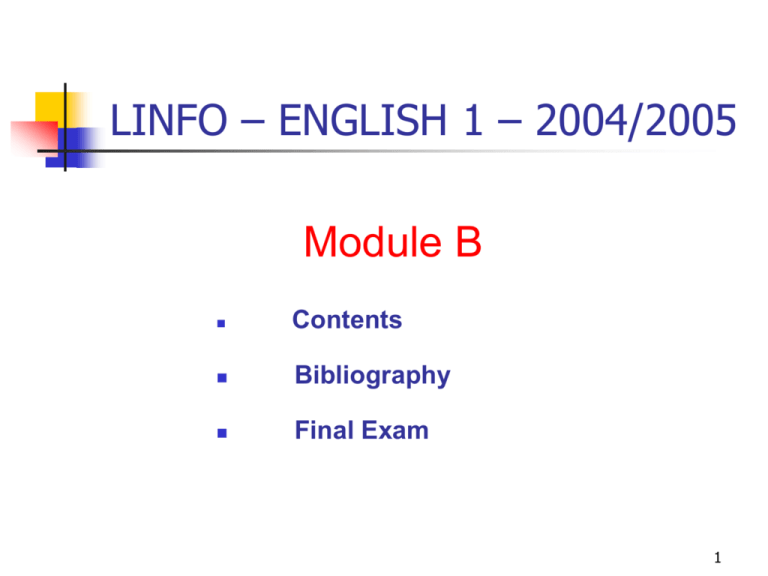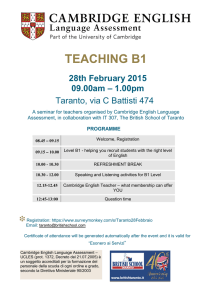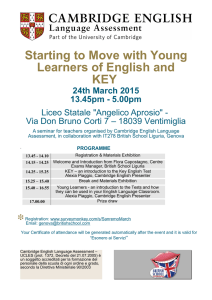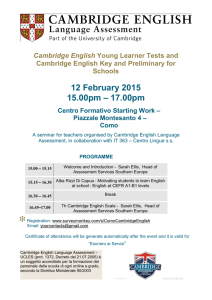Module B presentation
advertisement

LINFO – ENGLISH 1 – 2004/2005 Module B Contents Bibliography Final Exam 1 MODULE B LANGUAGE AND ICT The impact of ICT on language habits 2 Module B - Contents Information Communications Technology (ICT) hypertext/hypermedia the Internet the Web the Website Homepage analysis criteria Evaluation of Homepages English as a global language English as the language of online communication 3 Module B - Contents The Internet and the WWW: the Internet the Web E-writing 4 Module B - Bibliography D. Crystal, English as a Global Language, Cambridge University Press J. D. Bolter, Writing Space: Computers, Hypertext, and the Remediation of Print, Lawrence Erlbaum Associates (Chapter 2: Writing as Technology and Chapter 3: Hypertext and the Remediation of Print) for the students who will not produce the final project A. Lazzari, S. O’Connor, R. Di Scala, Bit By Bit, Computer English, Milano, Hoepli (Modules A and B) Riley David, Check your vocabulary for computing – a workbook for users, Peter Collin Publishing (Modules A and B) 5 Module B - English as a Global Language Contents 1. Why a global language? 2. 3. 4. 5. Why English? The historical context Why English? The cultural foundation Why English? The cultural legacy The future of global English 6 Module B 1. English as a Global Language Why a global language? What it a global language? What makes a global language? Why do we need a global language? What are the dangers of a global language? Could anything stop a global language? A critical era. 7 Module B - English as a Global Language 2. Why English? The historical context Origins America Canada The Caribbean Australia and New Zealand South Africa South Asia Former colonial Africa South-East Asia and South Pacific A world view 8 Module B - English as a Global Language 3. Why English? The cultural foundation Political developments Access to knowledge Taken for granted 9 Module B - English as a Global Language 4. Why English? The cultural legacy International relations The media The press Advertising Broadcasting Cinema Popular music International travel International safety Education Communications The right place at the right time 10 Module B - English as a Global Language 5. The future of global English The rejection of English Contrasting attitudes: the US situation New Englishes The linguistic character of New Englishes Grammar Vocabulary Code-switching Other domains The future of English as a world language An English family of languages? A unique event? 11 Module B - English as a Global Language Links http://www.wordsmith.org/chat/dc.html A Chat With David Crystal (transcript) http://users.aber.ac.uk/pjm04/globallanguage.html A research carried out at the University of Wales. http://elt.britcoun.org.pl/l_lang.htm The Language Revolution http://www.bbc.co.uk/radio4/routesofenglish/storysofar/programme4_6.shtml from BBC Radio http://www.bbc.co.uk/radio4/routesofenglish/storysofar/programme4_6.shtml An article from Newsweek http://21stcentury.chinadaily.com.cn/article.php?sid=1423 Who is really native? An article by David Nunan http://www.economist.com/world/europe/displayStory.cfm?Story_ID=883997 An article from The Economist 12 Module B - Exam Oral Exam + Project: production of a small hypertext on one of the topics developed in the book “English as a global language” (pair work) 13 Module B - Links Hypertext and hypermedia http://old.artun.ee/center/eng/marginal_status/hprtxt.html What is hypertext and hypermedia? http://www.cyberartsweb.org/cpace/ht/htlecture/index.html Definition of Hypertext http://www.uiowa.edu/~iareview/mainpages/tirweb.html The Iowa Review Web: Journals http://www.cyberartsweb.org/cpace/111/htc/title.html : Cyberspace, Hypertext, and Critical theory http://www.cyberartsweb.org/cpace/infotech/infotechov.html Infotech -- The History, Implications, and Contexts of Computing, Printing, and Other Information Technologies http://www.w3.org/Talks/9510_Bush/Talk.html Hypertext and Our Collective Destiny by Tim Berners-Lee, 12 October 1995 http://www.altx.com/htc/ov.html hypertextual consciuosness http://www.w3.org/Terms.html Hypertext Terms glossary http://carbon.cudenver.edu/~mryder/itc_data/hypertext.html#intro Hypertext (journals, history, theory) http://www.cyberartsweb.org/cpace/ht/music1.html Music in Hypertexts: Toward a Real Media Integration 14 Module B - Links History of hypertext http://www.cyberartsweb.org/cpace/ht/historyov.html The history of hypertext http://www.ibiblio.org/pioneers/index.html Internet pioneers http://esocentric.gmu.edu : Center for History and New Media http://www.xanadu.net/ :PROJECT XANADU, XANADU ARCHIVE PAGE, the Xanadu model http://www.bootstrap.org/chronicle/chronicle.html : biographical sketch of Douglas C. Engelbart http://www.csi.uottawa.ca/%7Edduchier/misc/vbush/awmt.html As We May Think by Vannevar Bush. Article published in July 1945 http://www.manifestation.com/neurotoys/eliza.php3 ELIZA – a computer program for the study of natural language communication between man and machine http://www.landow.com Websites Created and Managed by George P.Landow http://www.cyberartsweb.org/cv/gplbio.html George P. Landow: A Brief Biography http://www.cyberartsweb.org/cpace/theory/theoryov.html Cyberspace, Virtual Reality, and Critical Theory http://www.aber.ac.uk/media/Students/bas9401.html Marshall McLuhan's 'Global Village' http://www.funet.fi/index/FUNET/history/internet/w3c/proposal.html Tim Berners15 Lee, March 1989 Module B - Links Computer and writing http://english.ttu.edu/kairos/6.2/coverweb.html Critical Issues in Computers and Writing – KAIROS: a journal for teachers of writing in webbed evironments http://www.useit.com/jakob/ Jacob Nielsen: the world's leading expert on user-friendly design. http://www.december.com/john/ John December: experienced writer, teacher, software developer, and freelance writer. His publications include articles and books about the World Wide Web, Internet, and Java. http://www.acs.ucalgary.ca/~dabrent Doug Brent: Rhetoric and Communications http://englishmatters.gmu.edu English Matter: about copyright http://www.cwrl.utexas.edu/~slatin/resources/ht_rsrc.html Hypertext and Electronic Publishing http://www.press.umich.edu/jep/08-01/ferris.html The Effects of Computers on Traditional Writing by SHARMILA PIXY FERRIS 16 Module B - Links Hyper-Poetry http://www.poemsthatgo.com Poems that Go http://epc.buffalo.edu/e-poetry/2001 E-Poetry Archive Hyper-Fiction http://www.cyberartsweb.org/cpace/ht/htlitov.html Hypertext Literature: An Overview http://www.eastgate.com new hypertext technologies and hypertext publishing, fiction, non-fiction, and poetry http://www.eliterature.org/dir/ A unique and valuable resource for readers and writers of digital texts. http://beehive.temporalimage.com BeeHive: Hypertext and Hypermedia Journal 17 Module B - Links Mind mapping http://en.wikipedia.org/wiki/Mind_mapping Mind mapping, from Wikipedia, the free encyclopedia http://www.innovationtools.com/resources/mindmapping.asp Mind Mapping Resource Center http://www.mapyourmind.com/howto.htm How to make a mind map in 8 steps Mind mapping software http://www.peterussell.com/Mindmaps/MMSoft.html Principal mind mapping software available http://www.inspiration.com/home.cfm: you can download a free trial (30 days) of Inspiration, a tool to develop ideas and organize thinking. 18 Website of the course www.itiscannizzaro.net/Ianni/torvergata/linfoweb/home/index.htm 19


